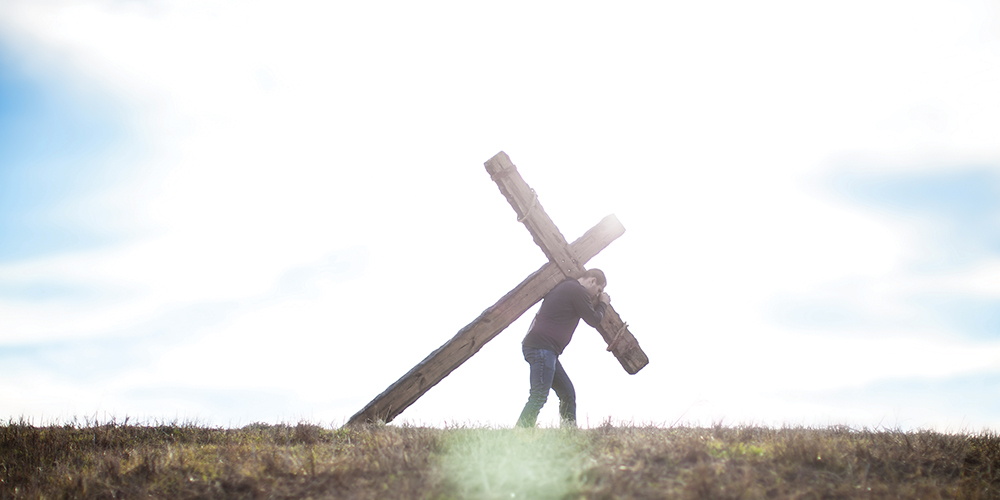背起十字架 Take Up Your Cross
Remember these points
I put these points at the top of my sermon-prep template to remind myself every week:
- Show that main point of passage relates to Jesus and his saving work
- (1 Cor 1:18) A truly gospel-centred message will not be acceptable in a synagogue or mosque
- Did I proclaim the gospel as the headline news of the sermon, rather than as a “by the way…”?
- Unbelievers are called to repent, believe, and be saved
- Believers are encouraged to abandon their old self, renew their minds, put on the new self in Christ
- Preach simple sermons, so that God’s people can see Christ more clearly and love him more dearly
News



Hook

诊断 (Zhěnduàn): Diagnosis
What does it mean: “We all have our crosses to bear“?
Three typical examples of how this expression is used:
- A congregation member said to the church elder: The church has some serious problems. This is your cross to bear!
- My daughter got into trouble again in school; we all have our crosses to bear!
- My husband was diagnosed with cancer for the third time; we all have our crosses to bear.
Which one of these examples is the correct usage of “take up your cross” or “bear your cross”?
None!
These are all commonly used expressions, but that’s not what Jesus meant when he said we must take up our own cross and follow him.

Passage
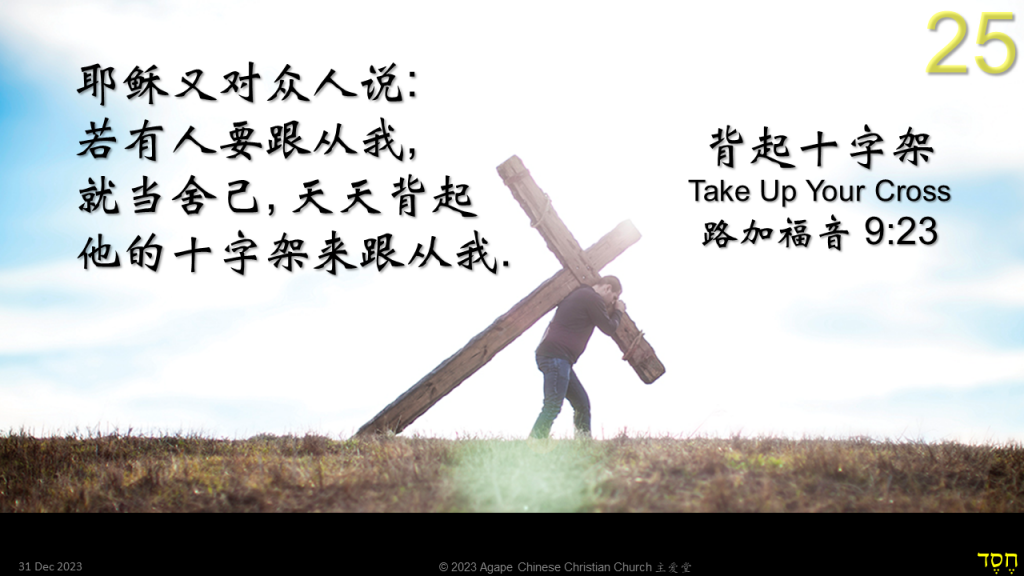
路加福音 9:23 CUV
耶稣又对众人说:「若有人要跟从我, 就当舍己, 天天背起他的十字架来跟从我.
Luke 9:23 ESV
And he said to all, “If anyone would come after me, let him deny himself and take up his cross daily and follow me.
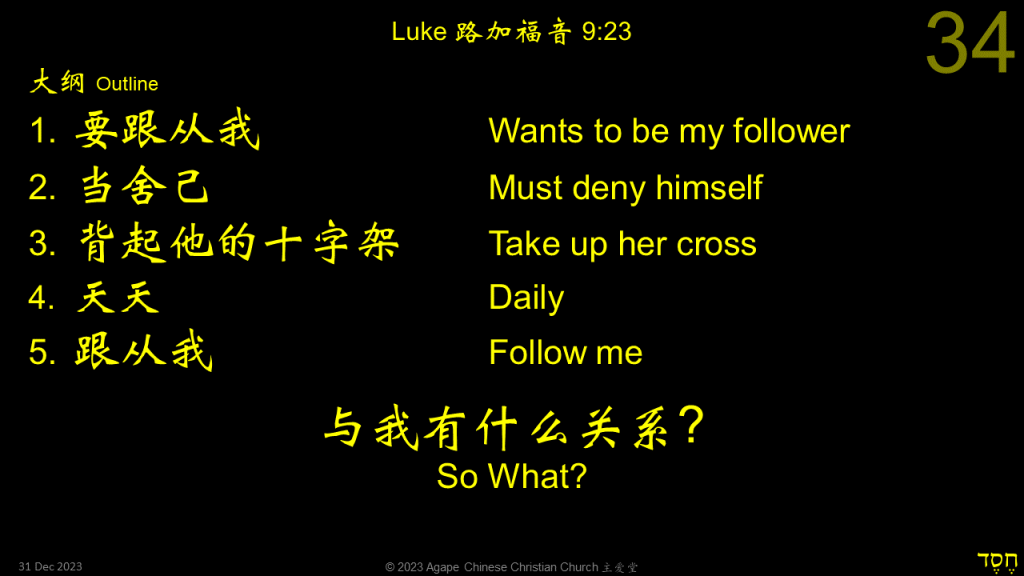
Section 1 要跟从我 Wants to be my follower
Passage
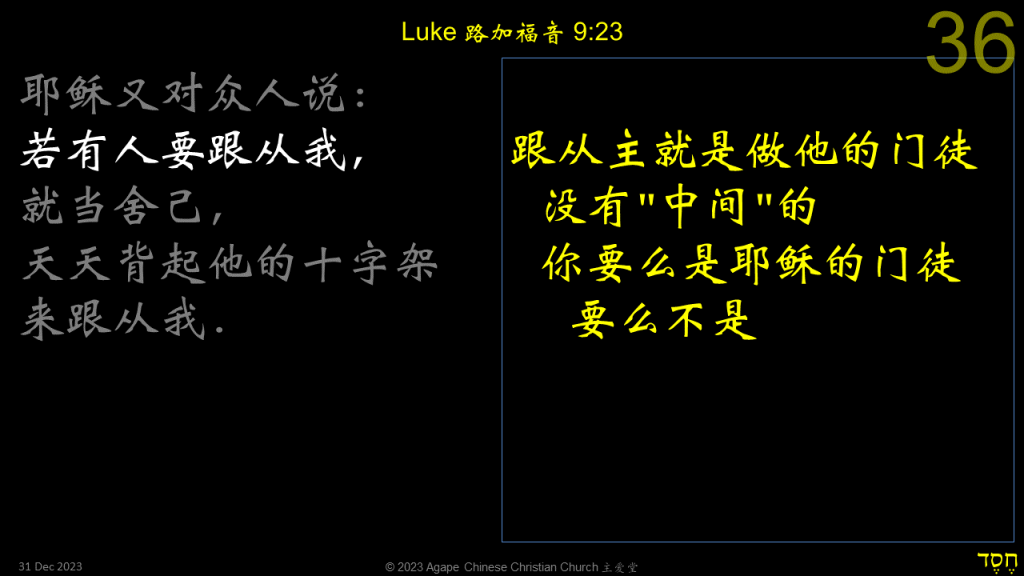
Lessons
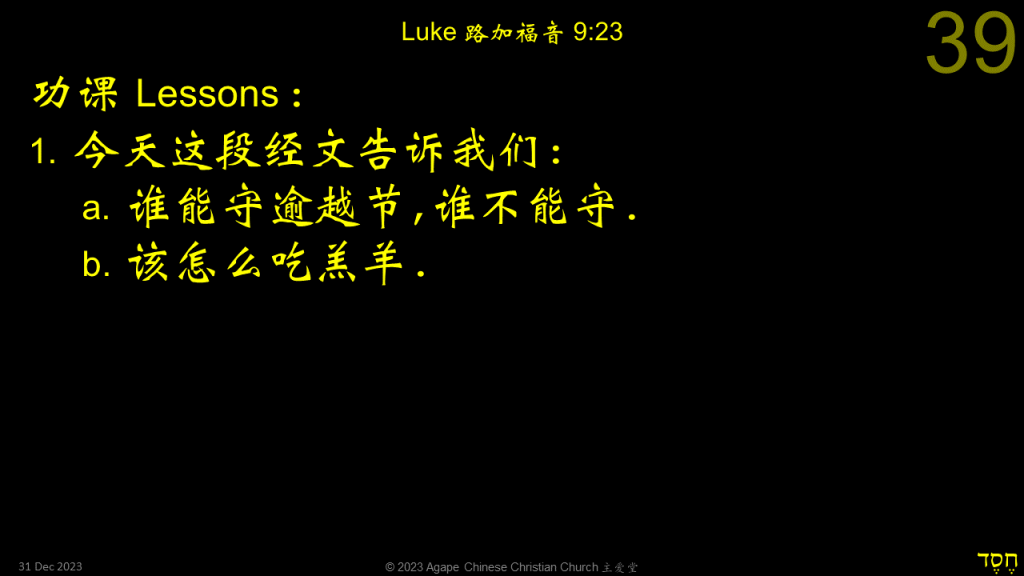
Section 2 当舍己 Must deny himself
Passage

效忠 (xiàozhōng): Allegiance
Meaning of the verb “to deny”
In Greek, the verb that’s translated “deny himself” is ἀρνέομαι (arneomai). The sense used in Luke 9:23 is:
- disregard, pay no attention to, deny oneself
- to refuse to pay any attention to, disregard, renounce; act in a wholly selfless way
The thing that is being denied is almost always associated with a person, e.g., to ἀρνέομαι (arneomai) someone means to purposely deny or dissociate with another person. This is the same verb used to describe Peter when he denied Christ three times.
We MUST deny ourself
This isn’t about whether “oneself” or “self” is good or bad.
It’s about whom is our primary allegiance to? To ourself, or to Jesus?
Lessons
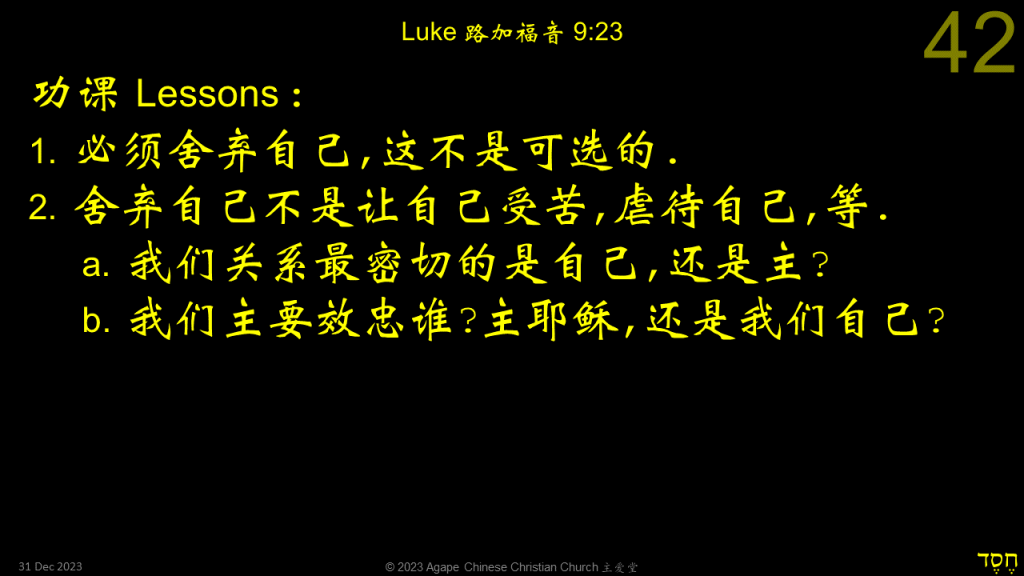
- To follow Jesus, we MUST deny “self,” this isn’t optional.
- Denying self doesn’t mean to make yourself suffer, or to mistreat yourself, etc. Don’t get the wrong idea and start starving yourself or whipping yourself!
- With whom are we most closely associated with? Our self, or Jesus?
- To whom do we give our primary allegiance? Our self, or Jesus?
Section 3 背起他的十字架 Take up her cross
Passage

How people in Jesus’ day understood the expression
“Take up your cross”
How did people in Jesus’ day understood this expression?
More modern expression: “You’ll get the chair for this!”
Today, especially in North America, it’s common to hear “You’ll get the chair for this!”
Everyone understands this to mean you’ll be executed on the electric chair for your crime.
“Take up your cross” meant only one thing: you’ll die!
Same for “take up your cross.” There’s only one understanding: you’re going to die on the cross.
In Roman times, political prisoners, runaway slaves, rebels fighting against Rome, etc., were executed by crucifixion.
It’s probably the most cruel and degrading form of punishment invented by humans.
The condemned person is made to carry his own cross (actually just the cross-beam) to the execution site.
This is to show everyone present that he rebelled against Rome, so that his final act is to carry his own instrument of his execution to the place of his death. He is completely, utterly, in submission to Rome, even in death.
Lessons

彻底 (chèdǐ): Utterly, completely
臣服 (chénfú): Surrender to
Taking up your cross:
- Doesn’t mean the little annoyances in our lives.
- Doesn’t mean the things we don’t enjoy or things we truly dislike.
- Doesn’t even describe truly difficult situations, like temptation, long-term illness, or difficult relationships with others.
Take up your cross = You’re going to die!
You are completely, utterly surrendered to Rome!
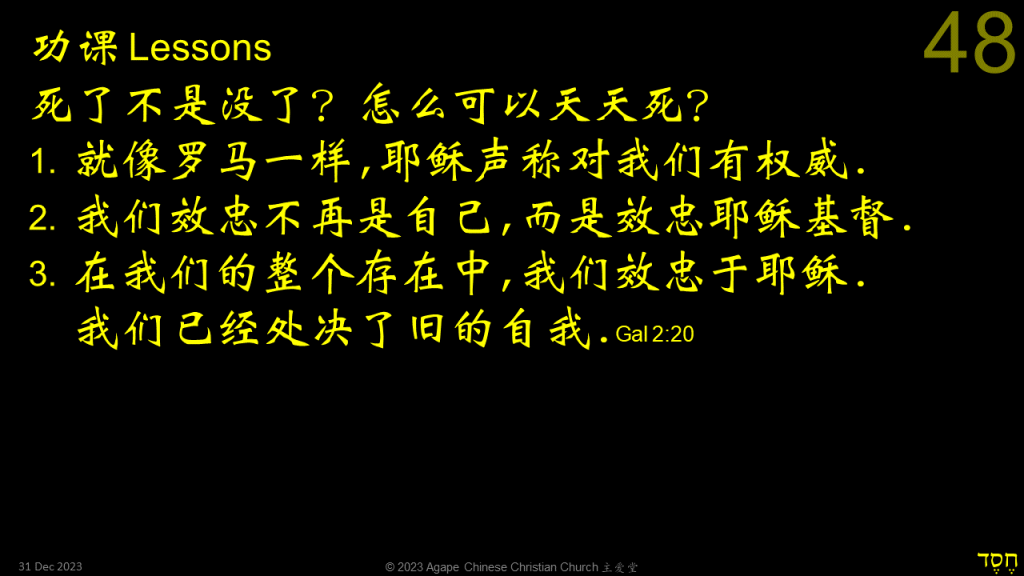
When we die, isn’t that the end? How am I to die (take up my cross) daily?
- Like Rome, Jesus is claiming authority over us.
- Our allegiance is no longer to ourselves, but to Jesus instead.
- In our entire being, our allegiance is to Jesus, we have executed our old self.
<49>
Section 4 天天 Daily
Passage
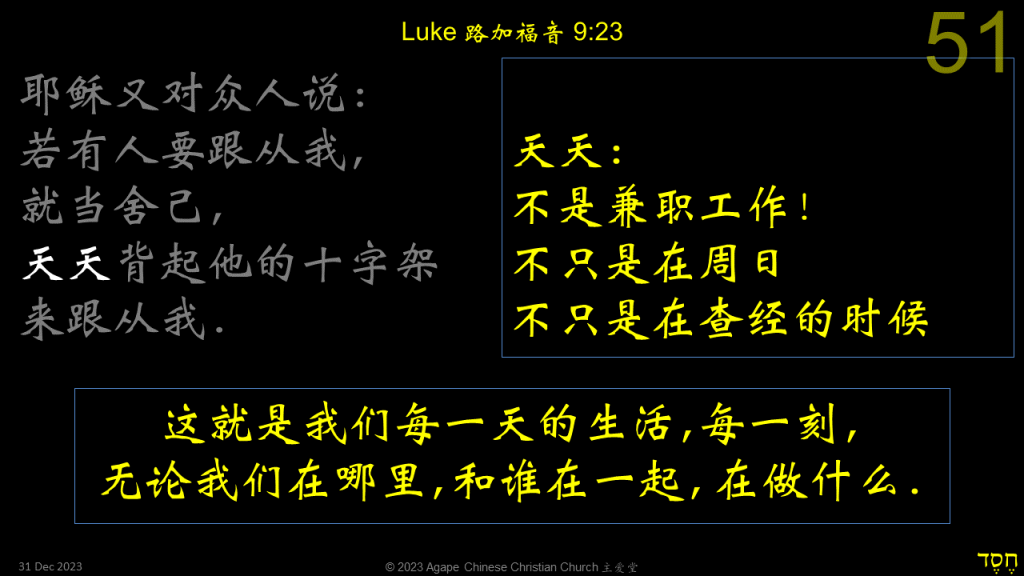
兼职工作 (jiānzhí gōngzuò): Part-time work
Lessons
Every day
Not a part-time job!
Not just on Sundays
Not just during Bible study
It’s our life, every day, every moment,
no matter where we are, whom we’re with, what we’re doing.
Section 5 跟从我 Follow me
Passage
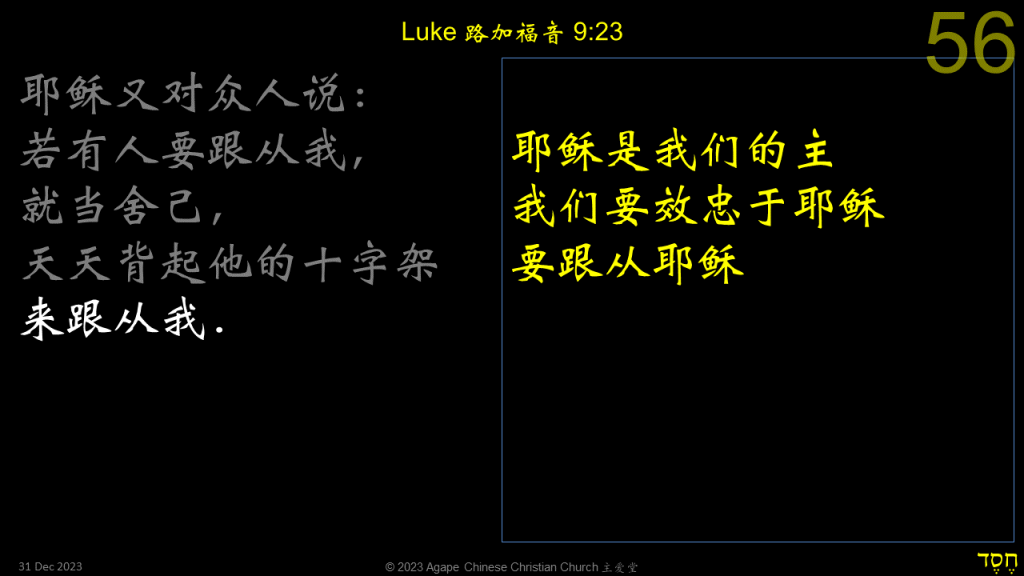
Lessons
Jesus is our Lord and master
Our allegiance is to Jesus
We have to follow Jesus
So What?

Lessons
- “Take up your cross” = You’ll die!
- Many people originally wanted to follow Jesus, but because of this “dying to self,” many have dropped out. We shouldn’t worry about people not wanting to hear the gospel, and try to “water it down,” to make it more palatable to non-believers. We should never compromise the message of God’s Word. Jesus didn’t compromise, neither should we.
- Our worship should be the same: We’re here to worship God, the praise God, not to make unbelievers feel good or feel comfortable.
- Only Jesus can remove our sins, will you put your faith in him?

